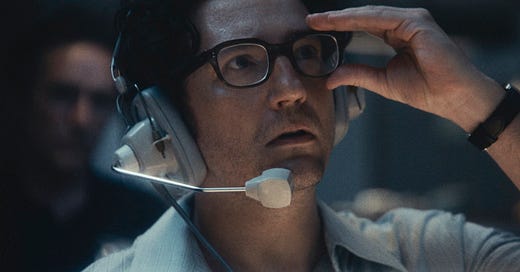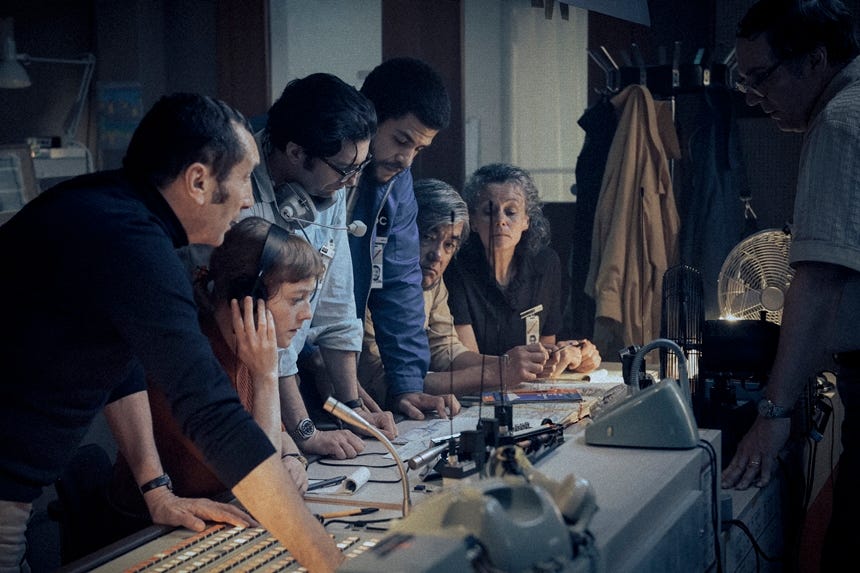September 5 (2024)
A televised terrorist act at the 1972 Munich Olympics can rattle our nerves today
John Magaro is riveting as the leader of a TV crew caught up in an unfolding crisis
September 5 (2024)
In theaters
It’s fun to feel tension build in a recent thriller like Carry-On, where an extortionist smuggles a bomb onto a plane. With every screenwriting twist we held our breaths to see if his dark plan would succeed.
But recreation of real-life mayhem can be just as nerve-wracking, even when we know how the actual event turned out.
This movie slams history in our faces. At 4:00 a.m. on September 5, 1972, gunshots rang out at the Olympic Village in Munich, West Germany. Palestinian terrorists calling themselves Black September seized 11 Israeli hostages and imprisoned them in a hotel.
They killed two hostages and threatened to kill the remaining nine if a group of Palestinian prisoners weren’t released.
How did America and the rest of the world learn of these harrowing events as they were happening?
On live television. That was unprecedented. And the suspense here is ratcheted up by dropping us into the cramped, monitor-packed Munich control room of ABC where the ordeal was sent out by satellite to the world.
Beamed around the globe, the Munich Summer Olympics was a sports event – not hard news – splashily produced by legendary ABC Sports President Roone Arledge (Peter Sarsgaard).
Leading the crack team he’s assembled is rookie production director Geoffrey Mason (John Magaro). It’s his first day on the job and Arledge fully backs him.
There’s no time to do otherwise, especially since ABC News headquarters is claiming they should take over coverage of a clearly political story and steer it from New York, insisting ABC Sports relinquish control.
Not happening, Arledge shoots back. He declares that Sports will keep the story and his team scrambles to stay on top of rapidly expanding events.
Archival footage is intercut with the filmmaking here to help recreate the in-the-moment impact of that fateful day.
Seamlessly woven in are 1972 in-studio clips of sports journalist Jim McKay, audio clips of Howard Cosell and partial recreations of reporting by anchor Peter Jennings (played in the movie by Benjamin Walker) giving eye-witness accounts of the hostages and their captors.
Mason, pushing the envelope, orders enormous live cameras hauled outdoors to home in on the hostage-takers’ moves.
We’re never confused about what the broadcasters are deciding, yet we can’t stop wondering how these newshounds are absorbing these horrific events.
This is moviemaking teamwork at its most sublime. Movies like this grip us because every element is both pressed to the hilt and suspended in a dazzling balance.
All of this is being broadcast live, and Arledge, Mason and producer Marvin Bader (Ben Chaplin) are faced with an alarming dilemma. The terrorists have television in their hotel room and are watching the odious scare tactic they’re carrying out.
Did they undertake it precisely because they knew it would be broadcast live to the world? If that was part of their plan from the get-go, what is ABC’s higher obligation now?
Should the network turn its cameras away from the terrorists, so as not to make a show of their political thuggery, or keep them pointed at those hotel rooms where masked gunmen appear on the balcony striking poses for worldwide attention?
Swiss writer-director Tim Fehlbaum hurtles us through these critical questions at a galvanizing clip. In a taut 85-minute runtime he sustains urgency across the tense 22 hours when lives hung in the balance.
More than 700 million people watched worldwide, and the authenticity Fehlbaum marshals from his collaborators captures, through TV camera lenses and on the faces in a packed control room, the violence and desperate negotiating that had no clear end.
Fehlbaum’s directorial challenge, which he meets spectacularly, is to re-enliven the technology and evoke the almost naive shock of 50 years ago while making events crackle like we’re witnessing them in real time.
He and fellow screenwriters Moritz Binder and Alex David have gotten to the essence of a quandary TV journalism hadn’t faced before: broadcasting terrorist acts not after the fact but live as they were being committed.
ABC sportscasters suddenly broadcasting a violent showdown with no clear resolution
The top-notch cast gives flawless performances. Magaro more than fulfills the promise he showed in Past Lives (2023).
He makes clear Mason’s sharp technical grasp of the split-second decisions he has to make as he calls camera shots. He also gives this untried producer the slowly dawning insight that reporting on tragedy means respecting its human dimensions, moment by moment.
Sarsgaard as the snarling Arledge is fearsomely protective of his assembled sports crew, and immovable in pushing back when the network tries to take the story away from them.
Chaplin as Bader, a Jewish member of the crew with painful personal memories of the Holocaust, carefully weighs the righteous anger his character feels alongside his journalistic responsibilities.
As Marianne Gebhardt, the operation’s only German speaker, Leonie Benesch shows remarkable sensitivity as the translator for American fellow journalists.
We see glinting in her eyes a profound regret that this Olympics, meant to show the world a new peace-loving Germany after WWII, is being sabotaged by ethnic violence perpetrated in her homeland again.
Production designer Julian R. Wagner makes the claustrophobic control room feel both sweaty and fraught with tension. All the recreated 1970s-era tech devices — phones, control panels, monitors, headsets, cameras, tape reels, walkie-talkies — were reconstructed to work exactly as they did in 1972.
Cinematographer Markus Förderer desaturates the colors, so the movie not only recalls 1970s TV it looks and feels like it. We’re enveloped in the era, even as the movie eerily brings to mind the terrorism we’ve experienced in the years since.
The capstone may be the bristling, tightly focused editing by Hansjörg Weissbrich. Broadcast decisions are broken into discrete, cleanly delineated moments.
We’re never confused about what the broadcasters are deciding, yet we can’t stop wondering how these newshounds are absorbing these horrific events. Lorenz Dangel’s edgy score drives home each stark, unpredictable turn.
This is moviemaking teamwork at its most sublime. Movies like this grip us because every element is both pressed to the hilt and suspended in a dazzling balance.
These are easily among the most captivating 85 minutes I watched in a 2024 movie release. In case anyone wonders, grainy old television, righteously and honestly depicted, sizzles.





